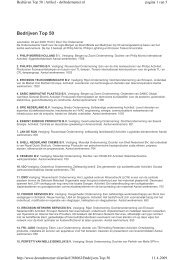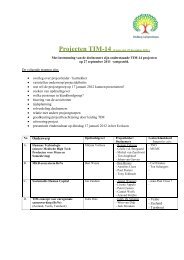The Triple Helix of university–industry–government relations
The Triple Helix of university–industry–government relations
The Triple Helix of university–industry–government relations
You also want an ePaper? Increase the reach of your titles
YUMPU automatically turns print PDFs into web optimized ePapers that Google loves.
L. LEYDESDORFF, M. MEYER: <strong>The</strong> <strong>Triple</strong> <strong>Helix</strong> <strong>of</strong> <strong>university–industry–government</strong> <strong>relations</strong><br />
perspective the role <strong>of</strong> theorizing becomes that <strong>of</strong> providing heuristics which can be<br />
applied to the study <strong>of</strong> historical puzzles and their solutions (SIMON, 1973).<br />
<strong>The</strong> <strong>Triple</strong> <strong>Helix</strong> overlay perspective adds to the perspectives on which it builds.<br />
<strong>The</strong> solutions at interfaces found hitherto can be provided with relevance for<br />
formulating innovative options because the boundary-spanning mechanisms can be<br />
expected to change the systems from which they emerged given the conditions <strong>of</strong> a<br />
knowledge-based economy. <strong>The</strong> interactions between the organized interfaces (e.g., the<br />
political economy and the knowledge infrastructure) may generate knowledge at a nextorder<br />
(global) level that feeds back on the local production processes <strong>of</strong> new knowledge<br />
(Figure 2). However, the knowledge production system is also changed because it is<br />
structurally interfaced with the economy after this path-dependent transition (DAVID &<br />
FORAY, 2002). <strong>The</strong> knowledge base feeds back on both the economic exchange and the<br />
organization <strong>of</strong> knowledge in innovation.<br />
Figure 2. <strong>The</strong> interactions generate a knowledge-based economy as a next-order system<br />
While hypotheses at the level <strong>of</strong> empirical case studies can <strong>of</strong>ten be specified with<br />
reference to a specific theory (e.g., about national or technological systems), the<br />
disciplinary frameworks function from this perspective as a mechanism <strong>of</strong> quality<br />
control (e.g., peer review). <strong>The</strong> exchange, however, adds to the disciplinary<br />
perspectives. For example, the study <strong>of</strong> patents as indicators in economic geography,<br />
200 Scientometrics 58 (2003)







